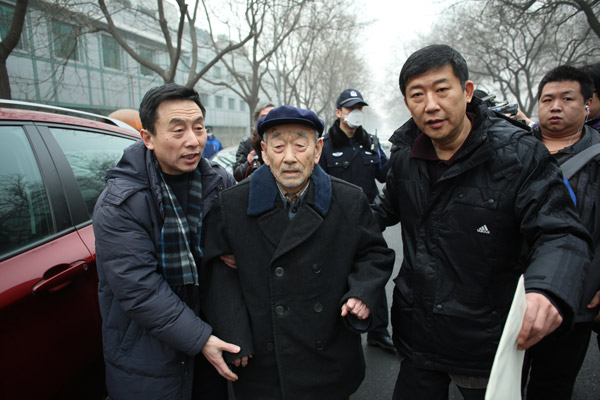Chinese citizens file suit against Japanese firms for forced labor
Updated: 2014-02-27 00:45
By ZHOU WA (China Daily)
|
|||||||||||
Her father Liu Qian was abducted to Japan to work in a mine in Nagasaki in 1944.
Liu Guolian's younger brother Liu Guoyou said: "We are angry and disappointed with Japan's incorrect attitude toward its brutal history. It should learn from Germany, seriously reflect on itself and sincerely apologize, so that victims like my father can rest in peace."
Kang showed reporters an X-ray of Liu Qian's leg, which was chopped off by his Japanese supervisor after he stopped working momentarily.
"Most of these Chinese forced laborers were treated inhumanly in Japan, which violated international humanitarian law as well as Chinese and Japanese domestic laws," Kang said.
Zhang Shijie, 88, a laborer who survived, said he was excited about the lawsuit being filed.
Zhang was abducted to Japan in 1944 to work at a coal mine in Nagasaki.
"We didn't have enough to eat and we were treated like prisoners," he said, adding that he and other workers were often beaten at work by Japanese foremen.
It will take some time before the lawsuit can be put on record officially and the court sessions begin, but lawyers for the plaintiffs, including Kang, are confident they can win.
Mitsubishi Materials was unable to comment because it did not know the details of the latest case, a spokesman for the company told Reuters.
Under Chinese law, Mitsubishi Materials, which has offices in Shanghai, should pay compensation to the plaintiffs if they win, said Zou Qiang-lun, another lawyer in the case.
Japan's Chief Cabinet Secretary Yoshihide Suga said he was aware of reports about the case, adding that it concerns individuals and private companies.
"However, we believe that according to a joint declaration between Japan and China the (right) to make these claims does not exist," he was quoted as saying by Reuters.
The Japanese government insists that all wartime compensation issues concerning China were settled by a 1972 joint statement establishing diplomatic ties.
But the Chinese Foreign Ministry said Japan's unilateral interpretation of the joint statement is "void".
On Wednesday, ministry spokeswoman Hua Chunying urged Japan to show a responsible attitude toward its history and handle the case appropriately.
The case comes amid strained relations between the two countries following Japan's illegal "purchase" of China's Diaoyu Islands in September 2012.
Tensions increased after Japanese Prime Minister Shinzo Abe visited the Yasukuni Shrine in December. The Tokyo shrine honors Japanese war dead, including 14 Class-A World War II war criminals.
Kang denied that the lawsuit is related to ties between the two nations.
But Wang Ping, a researcher of Japanese studies at the Chinese Academy of Social Sciences, said, "The case, together with recent similar cases in South Korea, will increase moral pressure on Japan."
Wang Xinsheng, a history and international affairs professor at Peking University, said Japan should correct its concept of history, otherwise it will become more isolated in East Asia.
Nearly 39,000 Chinese laborers were abducted and forced to work for 35 Japanese companies from 1943 to 1945 and nearly 7,000 of them died in Japan. Nearly 9,500 Chinese laborers worked for the two Japanese companies named in the latest lawsuit, and 1,745 of them died.
 |
|
Zhang Shijie (center), 88, who was forced to work as a laborer in Japan in 1944, arrives at Beijing No 1 Intermediate People’s Court on Wednesday. Wang Jing / China Daily |
Related Stories
A New Start:Japan's Economic Recovery and China-Japan Economic Relations 2014-02-26 16:54
What's the difference between Germany and Japan? 2014-02-26 10:12
Draft calls for nuke power to continue in Japan 2014-02-26 07:16
Dates Japan cannot deny 2014-02-26 07:15
China slams Japan over controversial moves 2014-02-25 22:07
Japan's pro-nuke voices worry world 2014-02-25 13:36
Today's Top News
Ukraine disbands riot police unit
Putin puts troops in W.Russia on alert in drill
Construction of China-Russia railway bridge starts
Turks stage protests demand PM's resignation
Forecast:China to lower growth rate
Italian new govt wins vote of confidence
Ukraine enters uncharted water
Li urges stronger S. China Sea ties
Hot Topics
Lunar probe , China growth forecasts, Emission rules get tougher, China seen through 'colored lens', International board,
Editor's Picks

|

|

|

|

|

|





